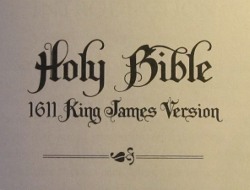YouTube: KJV Singles Website
Discussion
KJV Only? How a Translation Became a Litmus Test for Orthodoxy
 Republished with permission from Baptist Bulletin July/Aug 2011. All rights reserved. This article is condensed from a paper presented at a Baylor University conference. A full version will be published in the Detroit Baptist Seminary Journal.
Republished with permission from Baptist Bulletin July/Aug 2011. All rights reserved. This article is condensed from a paper presented at a Baylor University conference. A full version will be published in the Detroit Baptist Seminary Journal.
This year marks the 400th anniversary of one of the most important pieces of English literature ever released. Arguably, no other book has had the widespread influence and lasting significance of the King James Version (KJV or AV) of the English Bible. Its American title is derived from King James (Stuart) the First of England (James VI of Scotland). His initial idea was for a new common Bible version, but there is no evidence that he ever authorized it for use in all English churches. Given the prevailing politics, with the Puritans agitating for religious freedom, it is unlikely that he would have attempted a formal declaration. Nevertheless, the new translation became the dominant English version and held that position for most of the next three centuries.
But with its celebrity status comes some interesting history. In the late 19th century, John William Burgon and some of his associates argued for the KJV against the Revised Version—not because the KJV was a superior English translation but because the underlying Greek text was a better Greek text than the RV used (the Westcott and Hort text).
Since the 1960s, some Christians have been debating the continued usefulness of the Authorized Version and the underlying Greek text for regular use in the life of the church. The battle over Bible versions in general, and the battle for the KJV in particular, has been a significant issue within some segments of American Protestantism. At the worst, some have come to regard American Christian fundamentalism as closely associated with the “KJV 1611.” The debate has reached the point where non-fundamentalists think the movement is cultish, and some laypeople within fundamentalism itself think that God is the One Who personally “authorized” the KJV as the Bible for the English-speaking world.
The defense of the KJV takes two approaches. Some argue that the KJV 1611 is the most accurate rendering of the original manuscripts for the English-speaking world, a position still held by some GARBC pastors. Other advocates (called KJV-only in this article) are more dogmatic, with many colorful figures advocating a range of peculiar views, for example, that the KJV is the perfect Word of God, able even to correct Greek and Hebrew manuscripts themselves. Both of these views will be examined in this article.
Discussion
DVD Review - KJB: The Book that Changed the World
[amazon B004K6FS5W thumbnail]
2011 marks the 400th anniversary of the King James Bible. The King James Bible has shaped the English language, inspired political and religious thought for generations and, arguably, changed the world.
Discussion
The Best Cure for KJVOism: A Real 1611 KJV

It has been widely publicized that the year 2011 is the 400th anniversary of the original publication of the “Authorized” or King James Version of the Bible in English. Historically, this translation has been the most widely used, at least since it overtook the previous champion, the Geneva Bible of 1560 (chiefly, at least initially, as a result of the legal suppression of the printing of the Geneva Bible by the British monarchy, in favor of the KJV).
Note, however, that the great majority of the editions and copies of the KJV printed and read in the past 400 years have been revisions rather than reprints of the original form of the KJV, with literally tens of thousands of revisions in spelling, punctuation and the use of italics, plus many hundreds of revisions in the precise wording of the text. Later editions also included the switch from “black letter” (“Gothic”) type to Roman, the widespread omission of the Apocrypha in the 18th and later centuries, along with the omission of an extended calendar and charts of biblical genealogies. Most unfortunately, later editions omit the extremely important and informative introductory essay, “The Translators to the Readers,” which was included in the original edition. In short, most KJV users, particularly those who claim to be “King James Version 1611 Only” in their beliefs, have never actually seen or used a real 1611 King James Version in the original form in which it was issued from the press in 1611.

Discussion